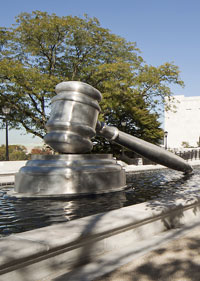Photo: Supreme Court of Ohio
Do your job.
That, in a nutshell, is the advice offered recently by the Supreme Court of Ohio’s Board of Professional Conduct to judges who decline to marry same-sex couples based on their personal, moral, or religious beliefs.
The
board’s advisory opinion provided guidance on two questions:
- May a judge who performs civil marriages refuse same-sex couples while continuing to marry opposite sex couples?
- May a judge decline to perform all marriages to avoid marrying same-sex couples?
The board answered both with a resounding “no.”
Laying Down the Law
Ohio judges are allowed to perform marriages, the board explained, “because of the unique public office that they hold.” Accordingly, conducting a civil marriage ceremony “is performing a judicial duty,” and judges must honor all responsibilities that come with that job.
For example, a crucial component of every judge’s job is honoring the judicial oath to “support the Constitution of the United States.” The
Obergefell v. Hodges decision held that same-sex couples have a 14
th
Amendment fundamental right to marry, and, as the board observed,
Obergefell is now “the law of the land.” Any judge who ignores that decision is simply not doing his job.
The judicial oath also makes it a judge’s job to “impartially discharge and perform all of the duties incumbent upon me as a judge.” The board characterized this language as “a reflection of the self-evident principle that the personal, moral, and religious beliefs of a judicial officer should never factor into the performance of any judicial duty.”
Indeed, this impartiality requirement resonates throughout the
code of conduct that essentially serves as the judiciary’s job description. The board analyzed seven rules of judicial conduct mandating that judges respect the
Obergefell decision, act with independence and impartiality, conduct judicial business without being swayed “by public clamor or fear of criticism,” and refrain from manifesting bias and prejudice “based upon a number of enumerated traits and characteristics, including sexual orientation.”
Why It’s Important
Judges who forsake these core job requirements, the board observed, damage public confidence in the judiciary and inflict tangible damage to the justice system. The board explained that any judge who opts not to perform same-sex marriage ceremonies “may reasonably be perceived as having a personal bias or prejudice based on sexual orientation,” and thus be subject to disqualification in any matter “where the sexual orientation of the parties is at issue.”
The board’s decision does not require judges who declined to perform all marriages prior to
Obergefell to perform any marriages now, but only applies to judges who modified their conduct to avoid
Obergefell’s holding. And as an advisory opinion, it does not carry the full force of law.
However, judges who ignore the board’s sage advice do so at considerable risk. The Ohio Supreme Court often relies on advisory opinions in disciplinary proceedings. And ignoring this opinion may prove particularly perilous for two additional reasons.
First, Ohio Supreme Court Chief Justice Maureen O’Connor issued a
directive on the day
Obergefell was decided, instructing all Ohio judges to comply with the Supreme Court’s ruling as quickly as possible.
Second, toward the end of its detailed opinion, the board reminds the judiciary that the principles on which it relies “are not novel,” but rather “are a restatement of the core tenets that have long governed judicial conduct and continue to guide the proper and ethical performance of a judge’s constitutional and statutory obligations.”
In other words, it’s simply advising judges to do their jobs.

